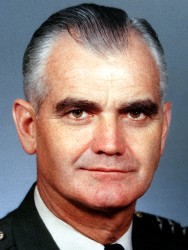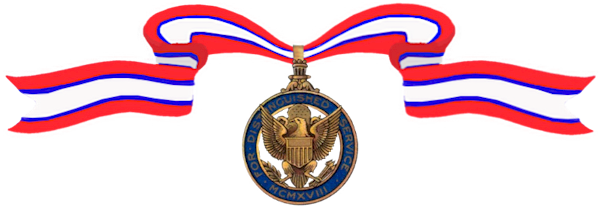William Westmoreland graduated from the U.S. Military Academy at West Point, Class of 1936. From July 3, 1968 to June 30, 1972, he served as the 25th Chief of Staff of the United States Army before retiring as a U.S. Army General.

–
Born:
,
Home:
,
Buried:
,
Cemetery:
Awards Received
-

Legion of Merit
-

Legion of Merit
-

Army Distinguished Service Medal
-

Army Distinguished Service Medal
-

Legion of Merit
-

Army Distinguished Service Medal
-

Army Distinguished Service Medal
-
Legion of Merit
Service:
United States ArmyRank:
Brigadier GeneralRegiment:
187th Regimental Combat TeamDivision:
11th Airborne DivisionAction Date:
1952 – 1953
United States Military Academy Register of Graduates(Citation Needed) – SYNOPSIS: The President of the United States of America, authorized by Act of Congress, 20 July 1942, takes pleasure in presenting a Second Bronze Oak Leaf Cluster in lieu of a Third Award of the Legion of Merit to Brigadier General William Childs Westmoreland (ASN: 0-20223), United States Army, for exceptionally meritorious conduct in the performance of outstanding services to the Government of the United States as Commanding General, 187th Regimental Combat Team, 11th Airborne Division, in Korea, from 1952 to 1953. The singularly distinctive accomplishments of General Westmoreland and his dedicated contributions in the service of his country reflect the highest credit upon himself and the United States Army.
-
Legion of Merit
Service:
United States ArmyRank:
Lieutenant Colonel (Field Artillery)Division:
9th Infantry DivisionAction Date:
1944 – 1945
United States Military Academy Register of Graduates(Citation Needed) – SYNOPSIS: Lieutenant Colonel (Field Artillery) William Childs Westmoreland (ASN: 0-20223), United States Army, was awarded a Bronze Oak Leaf Cluster in lieu of a Second Award of the Legion of Merit for exceptionally meritorious conduct in the performance of outstanding services to the Government of the United States as Chief of Staff, 9th Infantry Division, in the European Theater of Operations, from 1944 to 1945.
-
Army Distinguished Service Medal
Service:
United States ArmyRank:
GeneralDivision:
Military Assistance Command, VietnamAction Date:
January 1966 – December 1967
Department of the Army, General Orders No. 15 (April 8, 1968)The President of the United States of America, authorized by Act of Congress July 9, 1918, takes pleasure in presenting a Bronze Oak Leaf Cluster in lieu of a Second Award of the Army Distinguished Service Medal to General William Childs Westmoreland (ASN: 0-20223), United States Army, for exceptionally meritorious and distinguished services to the Government of the United States, in a duty of great responsibility as Commander, Military Assistance Command, Vietnam, during the period from January 1966 to December 1967.
-
Army Distinguished Service Medal
Service:
United States ArmyRank:
GeneralDivision:
Military Assistance Command, VietnamAction Date:
December 1967 – July 1968
Department of the Army, General Orders No. 44 (August 22, 1968)The President of the United States of America, authorized by Act of Congress July 9, 1918, takes pleasure in presenting a Second Bronze Oak Leaf Cluster in lieu of a Third Award of the Army Distinguished Service Medal to General William Childs Westmoreland (ASN: 0-20223), United States Army, for exceptionally meritorious and distinguished services to the Government of the United States, in a duty of great responsibility as Commander, Military Assistance Command, Vietnam, during the period from December 1967 through July 1968.
-
Legion of Merit
Service:
United States ArmyRank:
Lieutenant Colonel (Field Artillery)Batallion:
34th Field Artillery BattalionAction Date:
1942 – 1943
United States Military Academy Register of Graduates(Citation Needed) – SYNOPSIS: Lieutenant Colonel (Field Artillery) William Childs Westmoreland (ASN: 0-20223), United States Army, was awarded the Legion of Merit for exceptionally meritorious conduct in the performance of outstanding services to the Government of the United States as Commanding Officer, 34th Field Artillery Battalion, from 1942 to 1943.
-
Army Distinguished Service Medal
Service:
United States ArmyRank:
GeneralDivision:
Military Assistance Command, VietnamAction Date:
August 1964 – December 1965
Department of the Army, General Orders No. 45 (December 1, 1966)The President of the United States of America, authorized by Act of Congress July 9, 1918, takes pleasure in presenting the Army Distinguished Service Medal to General William Childs Westmoreland (ASN: 0-20223), United States Army, for exceptionally meritorious and distinguished services to the Government of the United States, in a duty of great responsibility as Commander, Military Assistance Command, Vietnam, during the period from August 1964 to December 1965.
-
Army Distinguished Service Medal

Department of the Army, General Orders No. 30 (July 6, 1972)The President of the United States of America, authorized by Act of Congress July 9, 1918, takes pleasure in presenting a Third Bronze Oak Leaf Cluster in lieu of a Fourth Award of the Army Distinguished Service Medal to General William Childs Westmoreland (ASN: 0-20223), United States Army, for exceptionally meritorious and distinguished services to the Government of the United States, in a duty of great responsibility as Chief of Staff, United States Army, from July 1968 to July 1972. During a period marked by significant changes in national strategy and priorities, General Westmoreland’s outstanding professional ability, personal integrity, and untiring leadership efforts were an inspiration to all the Army. Under his guidance, the Army began the complex transition from a force of one and a half million men, shouldering the major burden of our prolonged national commitment in Southeast Asia, to a smaller, highly professional force, qualitatively structured to support the national strategy requirement of the Seventies. General Westmoreland initiated programs to provide for the restructuring, realignment, and modernization of Army forces in order to improve force capabilities and best meet our global national commitments. He instituted measures to revitalize leadership and professionalism throughout the ranks, to include the design of a new Officer Personnel Management System, a Noncommissioned Officer Education System, and an Enlisted Qualitative Management Program. General Westmoreland was particularly concerned with the men and women of the Army and devoted himself unsparingly to improving service life and providing the soldier with an unprecedented sense of personal choice, dignity, and self discipline. He insisted on meaningful and challenging training for every person in the Army and the effective utilization of skills in tasks directly related to unit missions. He directed that the responsibilities for designing unit training programs be returned to the unit commanders and urged leaders at all levels to make use of mission-type orders and permit their subordinates maximum initiative in accomplishing assigned tasks. In adjusting the priorities for future military spending, General Westmoreland resolutely defended programs aimed at improving the working environment and living standard of American soldiers worldwide. His imaginative and unrelenting efforts to improve service attractiveness, job satisfaction, and public understanding have been instrumental in moving the Army toward the President’s goal of an all-volunteer force. His exceptional leadership and selfless dedication to duty throughout this period are the hallmarks of his brilliant career. A grateful Nation recognizes that General Westmoreland’s long and distinguished service, covering three wars and more than 36 years of devoted duty, has been in the finest traditions of the military profession. His loyal and illustrious service to the United States, in successive positions of the greatest responsibility, reflects the highest credit upon himself, the Army, and the Nation.

